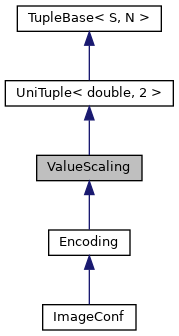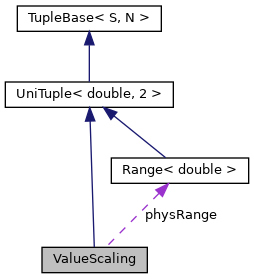 |
|
Loading...
Searching...
No Matches
 |
|
Linear scaling and physical range for image intensities. More...
#include <ValueScaling.h>


Public Member Functions | |
| ValueScaling (double scale=1.0, double offset=0.0) | |
| ValueScaling (double scale, double offset, const drain::Range< double > &range) | |
| ValueScaling (const drain::ValueScaling &scaling) | |
| ValueScaling (const drain::UniTuple< double, 2 > &scaling) | |
| ValueScaling (const drain::ValueScaling &scalingIn, const drain::ValueScaling &scalingOut) | |
| ValueScaling & | operator= (const drain::ValueScaling &scaling) |
| virtual void | setScaling (double scale, double offset) |
| Set linear scaling. | |
| virtual void | setScaling (const ValueScaling &scaling) |
| virtual const ValueScaling & | getScaling () const |
| Get linear scaling. | |
| virtual ValueScaling & | getScaling () |
| Get linear scaling. | |
| void | setAbsoluteScale () |
| If the intensities of the image correspond to an absolute value (like count) then the scale should be reset to unity with this function. | |
| void | setNormalScale (const std::type_info &t) |
| For "small integer" types, resets offset and scale such that maximum code value corresponds to 1.0 (100% intensity). | |
| void | setConversionScale (double scale, double offset=0.0, double scaleOut=1.0, double offsetOut=0.0) |
| If the intensities of the image correspond to a physical value (like temperature), then the scaling coefficient should be set with this function. | |
| void | setConversionScale (const drain::ValueScaling &s1, const drain::ValueScaling &s2) |
| Set scaling for which scaling.inv(x) = s2.inv(s1.fwd(x)) | |
| void | setConversionScale (const Range< double > &r1, const Range< double > &r2) |
| void | setOptimalScale (const std::type_info &t) |
| If storage type is integer, adjust scale such that resolution is maximized. | |
| void | setPhysicalScale (const std::type_info &t, double min, double max) |
| Sets physical range (min, max) and scales storage type accordingly. | |
| void | setPhysicalScale (const std::type_info &t, const drain::ValueScaling &scaling) |
| Sets physical range (min, max) and scales storage type accordingly. | |
| const Range< double > & | getPhysicalRange () const |
| Returns a typical or supported range for physical values. | |
| Range< double > & | getPhysicalRange () |
| Returns a typical or supported range for physical values. Modifying the range will not change scaling. | |
| void | setPhysicalMax (double max) |
| In integer-valued images, set the physical values corresponding to [0, maxCodeValue]. | |
| template<class T > | |
| void | setPhysicalRange (const Range< T > &range) |
| Sets the supported range for physical values. Does not change scaling or type. | |
| void | setPhysicalRange (double min, double max) |
| Sets the supported range for physical values. Does not change scaling or type. | |
| double | getScale () const |
| Returns the intensity scaling factor. See set setScale() | |
| double | getOffset () const |
| Returns the intensity scaling offset, ie. b in a*x + b . See set setScale() | |
| bool | isScaled () const |
| Returns true, if scaling has effect ie. scale!=1.0 or offset!=0.0. | |
| double | getMinPhys () const |
| Returns the minimum physical value. | |
| double | getMaxPhys () const |
| Returns the maximum physical value. | |
| bool | isPhysical () const |
| Returns true, physical intensity range has been set. | |
| void | adoptScaling (const drain::ValueScaling &srcScaling, const std::type_info &srcType, const std::type_info &dstType=typeid(void)) |
| Sets scale and offset according to physical range and current type. | |
| double | fwd (double x) const |
| Forward scaling: given encoded value x, returns corresponding value (possibly physically meaningful). | |
| double | inv (double y) const |
| Inverse scaling: given physically meaningful value y, returns the corresponding code value. | |
| virtual void | toStream (std::ostream &ostr) const override |
| std::string | str () const |
 Public Member Functions inherited from UniTuple< double, 2 > Public Member Functions inherited from UniTuple< double, 2 > | |
| UniTuple (const TT &... args) | |
| UniTuple (const UniTuple< double, N > &t) | |
| Copy constructor. | |
| UniTuple (std::initializer_list< S > l) | |
| tuple_t & | operator= (const tuple_t &t) |
| tuple_t & | operator= (const value_type &value) |
| tuple_t & | operator= (std::initializer_list< S > l) |
| virtual const_iterator | begin () const override final |
| virtual iterator | begin () override final |
| virtual const_iterator | end () const override final |
| virtual iterator | end () override final |
| const tuple_t & | tuple () const |
| tuple_t & | tuple () |
| tuple_t & | tuple (const TT &... args) |
| void | debug (std::ostream &ostr) const |
 Public Member Functions inherited from TupleBase< S, N > Public Member Functions inherited from TupleBase< S, N > | |
| const S & | at (size_t i) const |
| Return const reference to element i. | |
| const S & | operator[] (size_t i) const |
| S & | at (size_t i) |
| Return reference to element i. | |
| S & | operator[] (size_t i) |
| bool | operator== (const tuplebase_t &t) const |
| Equality operator. | |
| bool | operator== (const value_type &t) const |
| Equality operator against single value. | |
| bool | operator!= (const tuplebase_t &t) const |
| Inequality operator. | |
| template<class T > | |
| T & | toSequence (T &sequence) const |
| Copy elements to a Sequence, like stl::list, stl::set or stl::vector. | |
| void | set (const tuplebase_t &t) |
| template<class T2 , size_t N2 = 2> | |
| void | set (const TupleBase< T2, N2 > &t) |
| Assign tuple of different type and/or size. | |
| void | set (const S &arg) |
| template<typename ... SS> | |
| void | set (const S &arg, const SS &... rest) |
| Set element(s). | |
| template<typename T > | |
| void | set (std::initializer_list< T > l) |
| template<class T > | |
| tuplebase_t & | assignSequence (T &sequence, bool LENIENT=false) |
| Proposed for tuples only; derived classes should not shadow this. | |
| void | fill (S i) |
| Set all the elements to i. | |
| void | clear () |
| virtual void | toStreamFormatted (std::ostream &ostr, char separator=',') const |
| std::string | toStr (char separator=',') const |
| virtual void | updateTuple () |
Public Attributes | |
| double & | scale |
| Multiplicative coefficient \i a in: y = ax + b. | |
| double & | offset |
| Additive coefficient \i b in: y = ax + b. | |
| drain::Range< double > | physRange |
| Minimum and maximum physical value of the imaged quantity (not limited to corresponding to minCodeValue?). | |
Additional Inherited Members | |
 Public Types inherited from UniTuple< double, 2 > Public Types inherited from UniTuple< double, 2 > | |
| typedef double | value_type |
| typedef UniTuple< double, N > | tuple_t |
| typedef double * | iterator |
| typedef const double * | const_iterator |
 Public Types inherited from TupleBase< S, N > Public Types inherited from TupleBase< S, N > | |
| typedef TupleBase< S, N > | tuplebase_t |
| typedef S | value_type |
| typedef S * | iterator |
| typedef S const * | const_iterator |
 Static Public Member Functions inherited from TupleBase< S, N > Static Public Member Functions inherited from TupleBase< S, N > | |
| static size_t | size () |
| Return the number of elements. | |
 Static Public Attributes inherited from UniTuple< double, 2 > Static Public Attributes inherited from UniTuple< double, 2 > | |
| static const size_t | tuple_size |
 Static Public Attributes inherited from TupleBase< S, N > Static Public Attributes inherited from TupleBase< S, N > | |
| static const size_t | storageTypeSize = sizeof(S) |
 Protected Member Functions inherited from UniTuple< double, 2 > Protected Member Functions inherited from UniTuple< double, 2 > | |
| UniTuple (UniTuple< double, N2 > &tuple, size_t i) | |
| double & | next () |
 Protected Member Functions inherited from TupleBase< S, N > Protected Member Functions inherited from TupleBase< S, N > | |
| void | setIndexed (size_t i) |
| Argument stack endpoint function; final step of variadic argument set(arg, ...) . | |
| template<typename T2 , typename ... TT> | |
| void | setIndexed (size_t i, T2 arg, const TT &... rest) |
| Worker called by set(T2 arg, T2 arg2, ...) | |
 Protected Attributes inherited from UniTuple< double, 2 > Protected Attributes inherited from UniTuple< double, 2 > | |
| const iterator | start |
Linear scaling and physical range for image intensities.
Internally,drain::ValueScaling holds variables
drain::ValueScaling does not store information of storage type (no either on minimum and maximum values supported by storage types).
|
inline |
Returns true, if scaling has effect ie. scale!=1.0 or offset!=0.0.
Note: returns true if scale==0. Maybe false would be better.
|
inline |
For "small integer" types, resets offset and scale such that maximum code value corresponds to 1.0 (100% intensity).
Applies to:
char unsigned charshort intunsigned short int
|
inlineoverridevirtual |
Reimplemented from TupleBase< S, N >.
 1.9.8
1.9.8